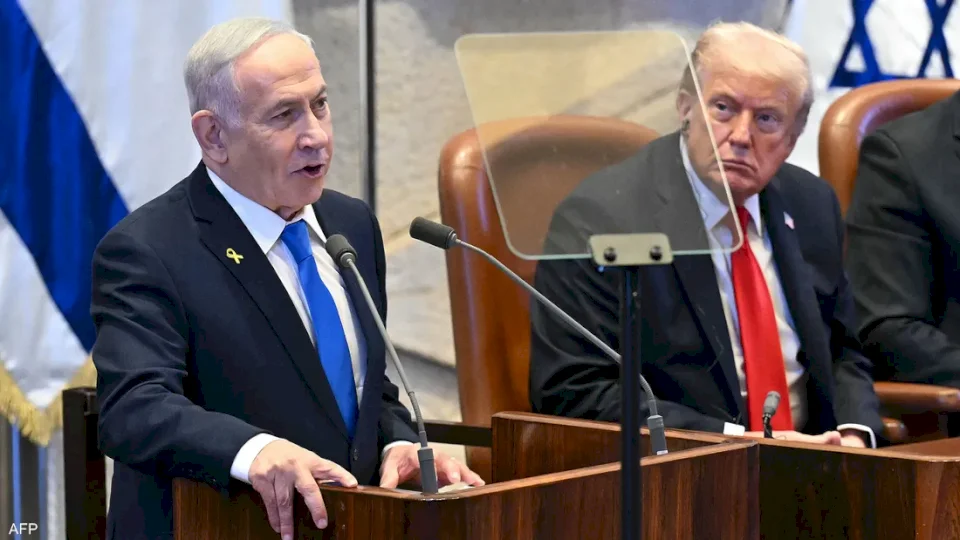
Netanyahu Holds Discussions After Ministers Criticize US Draft Resolution on Palestinian State
SadaNews - Israeli Prime Minister Benjamin Netanyahu held discussions today, Sunday, in the reduced political-security cabinet regarding a third draft of the resolution presented by the United States to the United Nations Security Council. The resolution stipulates that once the Palestinian Authority implements the required reforms and begins the process of rebuilding Gaza, "the conditions may become suitable for a reliable path towards self-determination and the establishment of a Palestinian state".
Netanyahu and the heads of the coalition parties left the weekly government meeting following the ministers' criticisms of the US draft resolution which refers to a "reliable path towards self-determination and the establishment of a Palestinian state", which will be voted on by the UN Security Council tomorrow, Monday.
Former Minister of Strategic Affairs Ron Dermer participated in the cabinet meeting despite his resignation, as reported by the "Wynet" website.
Wynet noted that Israel is attempting behind the scenes to introduce amendments to the US draft resolution through intensive communications with the US administration.
At the beginning of his government meeting today, Netanyahu stated, "Our opposition to a Palestinian state anywhere west of the Jordan River has not changed. This opposition exists and has not changed." He added, "I have repelled these attempts for decades, and I do so also against external and internal pressures. I do not need support, tweets, or lectures from anyone."
Netanyahu added that "with regard to the alleged issue of 'disarmament' of the area controlled by Hamas in Gaza, this will not happen. Even in the twenty-point plan (Trump's plan to end the war and exchange prisoners), and in anything else, the armament of this area and Hamas will be dismantled. It will be done either in an easy way or a hard way. That’s what I said and that’s what President Trump said too."
The US draft resolution states that "the United States will establish a dialogue between Israel and the Palestinians to agree on a political horizon for peaceful and prosperous coexistence".
In a statement from the US mission to the United Nations, it was mentioned that there would be "attempts to sow discord, while negotiations are actively ongoing for an agreement on this decision, with serious, tangible, and entirely avoidable repercussions on the Palestinians in Gaza".
It added that "the ceasefire is fragile, and we call on the council to unite and move forward to ensure the much-needed peace," considering it a "historic moment to pave the way for lasting peace in the Middle East".
Last week, US officials conducted negotiations within the Security Council regarding a draft resolution that would follow up on the ceasefire in the Gaza Strip and approve Trump's plan. The third draft of the resolution "welcomes the establishment of a peace council," which is a transitional governing body for Gaza that is theoretically supposed to be chaired by Trump for a term lasting until the end of 2027.
This resolution would also allow member states to form a "temporary international stabilization force" working with Israel, Egypt, and the recently trained Palestinian police to help secure border areas and disarm Gaza. This force would also be tasked with "permanently disarming non-state armed groups," protecting civilians, and securing humanitarian aid corridors.
However, while it seems that council members support the establishment of a "peace council" in principle, Agence France-Presse reported that diplomats raised questions about the draft resolution. These include the lack of any mention in the text of a monitoring mechanism by the Security Council, or the future role of the Palestinian Authority, or details regarding the international force.
The US draft resolution faces widespread opposition from Russia, China, and a number of Arab countries, which express concerns over the establishment of a "peace council." Moscow and Beijing, which hold veto power in the Security Council, demand the removal of the reference to the "peace council," according to what was reported by the Associated Press from diplomats familiar with the ongoing negotiations.
Last week, the United States distributed a preliminary draft to all 15 Security Council members, which stipulates granting a wide international mandate to the stabilization force to provide security in Gaza until the end of 2027, in cooperation with the yet-to-be-formed "peace council."
Russia, China, and Algeria rejected the first draft, and all member states of the council, except for two, submitted amendments to it, according to one diplomat speaking to the Associated Press. Points of contention related to the path towards an independent Palestinian state and the timetable for the withdrawal of Israeli forces from the Gaza Strip, as stated by two diplomats. The third draft responds to objections regarding the absence of a vision for the future of an independent Palestinian state, but without definitive commitments.
Israeli political officials stated over the past weekend that the US third draft resolution includes provisions that are "uncomfortable for Israel," including, alongside the path to establishing a Palestinian state, the clause that prevents Israel from objecting to countries sending troops to the stabilization force in the Gaza Strip.

Israeli Estimates: The Iranian Ballistic Threat Will Remain and the Rate of Its Attacks Wi...

The Hague Group Holds an Emergency Meeting on March 4, 2026, Regarding Accountability and...

The President to His Lebanese Counterpart: We Support Any Steps Taken by Lebanon to Achiev...

Report: America Begins Attacking Iranian Nuclear Targets

Rutte Praises the War on Iran but Confirms NATO's Non-Involvement

"No Backing Down and Good Luck".. Behind the Scenes of Trump's Final Decision to Strike Ir...

Israeli Chief of Staff: We Will Not End the Battle Before Eliminating the Threat from Leba...

